Software Freedom in Europe 2020
"Software Freedom in Europe" is the yearly report of the Free Software Foundation Europe e.V. (FSFE). In one document, it gives you a breakdown of important things the FSFE has done and achieved during the last 12 months.
No report about the status of software freedom and the FSFE in 2020 can possibly be written without mentioning the impact the global spread of COVID-19 had on our organisation and the global process of digitisation. Software Freedom in Europe gives you a quick overview of the challenges our community had to overcome and the successes we have achieved. The report will further concentrate on the FSFE's different areas of activities, our long-term goals, and our achievements in the last twelve months.
To help you navigating through the report, we have grouped its content along the three pillars of our activities: Policy Advocacy, Legal Support, and Public Awareness. We finish the report with insights into our activities, numbers from our merchandise and information materials, an introduction to our team members and our community, and an outlook into the next 12 months.
Enjoy the read and if you are not a supporter yet, consider supporting software freedom in Europe.
Table of contents
Enabling trust in a digital society
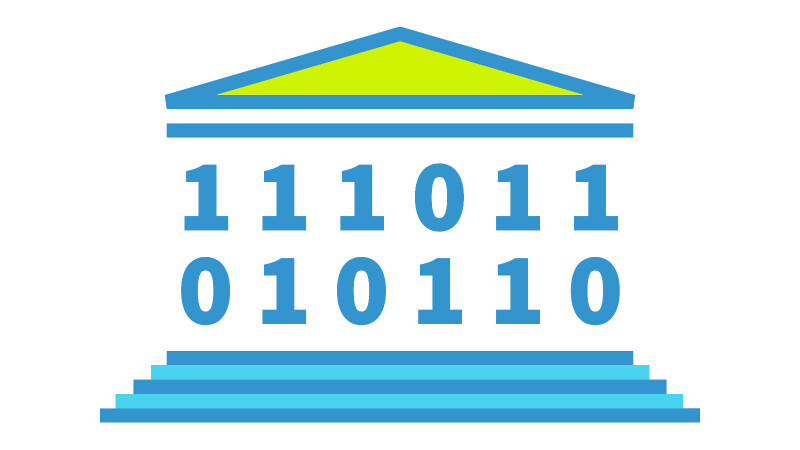
In recent months there have been a lot of changes and challenges for us. As you will read in this report, many organisations made quick decisions and introduced proprietary software for their remote communication, there were almost no physical events happening to promote software freedom, and there were almost no opportunities during the year to spend social time together. I miss those times with you, receiving direct personal feedback for our work, building or enlarging the FSFE's network as well as nourishing personal friendships. It is much harder to work together remotely for our joint mission without those energising moments in which we see each other in person.
One other aspect that became apparent to me during the pandemic was how many people have lost or are losing confidence in democratic institutions and processes. One component of this lack of confidence in democracy is a lack of confidence in technology. And this lack of confidence is something where our work for Free Software can make a positive change.
Technology is becoming more and more complex and it is more and more difficult to understand how it works. At the same time, technology is becoming increasingly important in more and more areas of our life. As many decisions, rules, and processes in our society are becoming more opaque for a large part of the population, there is a loss of confidence in them.
As technology creators, the Free Software community has a duty to our society. We must actively counter the loss of confidence caused by complex technology. We ourselves must actively break the power of technical creators and help people understand the meaning, purpose and function of technology and thus enable them to determine their own uses for technology.
People must not resign themselves and think "The computers do what they want, anyway". We must give people confidence that no one is excluded from shaping technology.
We have to talk about what rules are implemented through technology and whether these rules reflect the laws and social norms of our society -- and how we change technology if it violates our laws and social norms; in order to protect them.
Everybody interested in helping citizens to trust the state must support such discussions and must not, on the contrary, punish people for analysing technology and discussing possible weaknesses and their potential negative impact on our society. If we do not make this possible, we nourish distrust in technology, distrust in society, distrust of state institutions, and distrust of our democracy.
For better confidence in software, as one important component of technology, four aspects are necessary:
- Confidence that digital tools are there for everyone, no matter what they were made for -- there must be no discrimination in the use of software.
- Confidence that everyone will be allowed to learn how the software works, which also requires the distribution of the source code. Access to the knowledge must not be artificially limited to a selected few.
- Confidence that other people may help me with the software and I am not on my own.
- Confidence that people will adapt the software to the needs of their family and friends, to those of an organisation, a company, an authority, or that of our society. Technology should be adapted to the people's needs, rather than people having to adapt to technology.
Software to be trusted must therefore allow using for any purpose, enabling studying and understanding, sharing with others, and improving accordingly. This is what Free Software always ensures and why Free Software is a crucial component to build confidence in the technologies that form our modern societies as well as the technologies that will form the societies of the future.
Success will depend on all of us. In order to regain confidence in a society with ubiquity of software, we have to demand the use of Free Software and support others in doing so. Developers and companies should publish their software as Free Software so it can be trusted. Public services, infrastructure, and education must be built on the use and development of Free Software to strengthen democracy.
Please read on to learn what the Free Software Foundation Europe contributed to our society during the last 12 months. I am proud to see what positive changes our contributors and staffers achieved despite the challenges we all faced.
In the name of the FSFE I wish you all the best,
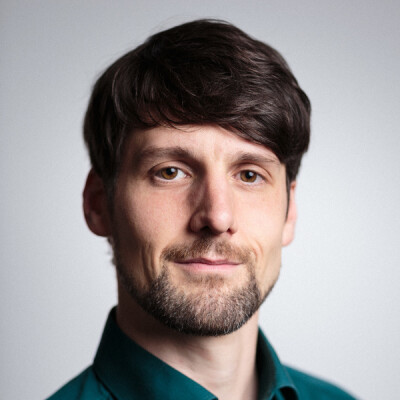
Matthias KirschnerPresident Free Software Foundation Europe
Software freedom in times of physical distancing
The outbreak of the SARS-CoV-2 virus brought a lot of changes for most people and organisations around the globe and so for us. With physical distancing came the cancellation of Free Software conferences, our own events, and FSFE community meetings. Booths and talks have always been one of the major channels over which we informed people about Free Software and the FSFE’s work. Losing these opportunities limits the visibility of our organisation and makes it harder to bring attention to the topics around software freedom in general.
But physical distancing had much more impact. Many institutions, companies and administrations had to quickly build up digital infrastructure this year, to adjust to the global situation and enable remote working for their employees. While our community tried to help them with an overview about good Free Software solutions for remote working, many organisations made bad decisions in a rush about their future digital infrastructure by choosing proprietary and unsustainable short-term solutions.
Global problems need global solutions
On the other hand, we also saw a lot of positive developments: Rather than being cancelled outright, more and more Free Software events are now moving online, and this helps to keep our communities strong. To some extent it even lowers the threshold of participation and gives new opportunities for people who might not have been able to participate in a physical event. Also, the urgent need to create new software - be it for COVID contact tracing abilities or for other urgent needs - opened windows of opportunity for us, that we successfully used to highlight the benefits of building public digital infrastructure in Free Software.

Free Software creates global solutions.
The European Union and the World Health Organisation followed our arguments that global problems need global solutions and why only Free Software can help us with this. Many member states complied and published their Corona tracing apps as Free Software, and we managed to convince public hackathons to publish results under a Free Software license. Even on the hardware side, the FSFE was able to convince a Dutch emergency ventilator project to use a free license.
Still, the story is ongoing. The virus will keep having an impact on our societies next year and potentially even longer. It will thus be important to keep explaining why short-term solutions are not good for our societies and how to ensure investing in freedom-respecting technologies.
Policy Advocacy
Political decisions and directions have big impact on Free Software, its ecosystems and its communities. The FSFE has long-time experience in working with policy-makers and public bodies in Europe, from local administrations to high-level decision makers. We are always aiming at enhancing the rights of Free Software users and developers and abolishing barriers to Free Software adoption. (read more about our general work on policy advocacy)
About the state of Free Software in European Public Policies
2020 has been a good part of our path to freedom. As indicated in the chapter about Corona and software freedom this is not entirely, but only partly, true for the manifold discussions around developing and releasing COVID-19 contact tracing apps. In this special moment our societies have experienced an unprecedented demand for rapid introduction of a new tracing technology that should potentially be used by every single member of our societies. During all these discussions, we have never tired of pointing out that any valid, healthy and sustainable solution for such a technology can only be Free Software. In subsequent weeks, many national and European agencies and administrations followed our arguments and publicly declared that any tracing app has to be published as Free Software. EU member states, supported by the European Commission, released a "Common EU Toolbox for member states" in which they asked to "openly publish the technical specifications and the source code for the apps, as a way to maximise re-use, interoperability, auditability and security".
Besides the pure fact that European member states used public money to publish Free Software to help tackle the crisis, the positive effect of the corresponding discussions, publications and decisions is priceless. Major international and national news agencies have reported about health care apps becoming Free Software and the benefits involved. In several countries we have seen a coalition of scientists, data protection agencies, ministries and politicians who argued in favor of software freedom. Every time they do, more people are understanding why software freedom matters for our society. And every time more people are understanding the importance of software freedom, it is likely that some of them join our cause.
Our new Open Science Coordinator Christian Busse about the state of Free Software in European scientific communities at the 36th Chaos Communication Congress.
These good signals go hand in hand with a year in that many administrations and political bodies have announced that they plan to follow our road to freedom. Starting at the end of last year with the biggest conservative party in Europe, the German CDU, who resolved to join FSFE in demanding that software developed with public money should be publicly available as Free Software, many more followed. Munich commits to "Public Money? Public Code!", the Netherlands commits to Free Software by default, Hamburg wants to focus more on Free Software, and the Spanish Municipality of Benigànim signs the Open Letter of our "Public Money? Public Code!" campaign.
These are just some of the highlights on our road to freedom in 2020. And while we still have a lot to do, it is important and encouraging for us and our mission to see what we can and what we did achieve. Continue to read below about our other policy achievements in the last 12 months, sorted by topics.
European public code
"Public Money? Public Code!" is the ongoing campaign of the FSFE that has achieved multiple milestones in its now three years of existence. More than 190 organisations and over 29.000 individuals signed our open letter demanding that publicly financed software developed for the public sector be made publicly available under a Free Software licence. Parts of the campaign are a professional video and an expert policy brochure, translated into multiple languages.
Biggest conservative party in Europe demand public code
The "Public Money? Public Code!" campaign has had a big influence on political bodies in Europe. Consequentially, in the last 12 months we saw many articles and references about public code and more and more organisations supporting our demand or directly signing our open letter. One of the highlights - as already mentioned in the article about the State of Free Software in European Public Policies - is the impact on the biggest conservative party in Europe, the Christian Democratic Union of Germany (CDU). The CDU updated their party convention so that it now includes the demand that software developed with public money should be publicly available as Free Software. Another highlight was to see Munich rethinking and committing themselves back towards software freedom by supporting our demand for public code. To help them keep their promise, we keep watching their political activities and after 100 days we published a first evaluation on Munich's developments.
Get our new multilingual Free Software sticker.
Knowledge exchange and common code repository
Driven by so much positive feedback, we continue to encourage discussions between public administrations and institutions and the exchange of best practices - technical, organisational and juridical - related to the publication of code. To this effect, in May this year we had been planning to organise the first of its kind conference tackling the various aspects surrounding public code and digital sovereignty. Unfortunately, as for so many other events this year, the conference had to be cancelled. But the high demand for our tickets and the high-level expertise among the participants who registered for the event demonstrate once more the huge interest in publicly funded code and its importance for our society.
The continuing interest in our #publiccode campaign beyond party lines and sectors just recently culminated in a new alliance of administrations, business and civil society organisations, who call for a collabroate code repository for Free Software developed by the public sector. Under the slogan "A place for public code", this interest group now wants to pave the way for a portal through which any public administration in Germany can exchange and jointly develop Free Software in an adequate and legally compliant manner.
User freedom starts from your router
Since 2013, the FSFE has been advocating for Router Freedom in Europe with outstanding results in Germany and with positive influence across Europe. In 2020 our long-term commitment has been extremely helpful, because a new set of rules came into play regarding Router Freedom, the new Guidelines on the Location of the Network Termination Point. Drafted by the Board of European Regulators for Electronic Communications (BEREC), these new regulatory rules threaten the fundamental rights of end-users to choose their own routers and modems. We immediately took a stand to protect users' freedom and started to balance the discussion with our input on the guidelines for Router Freedom in Europe.
Meanwhile, BEREC has published their result of the public consultation. Within this publication, BEREC fortunately sided with the FSFE's demand that any router and modem be under the full control of the user, who can freely decide which device to use - not in control of the Internet Service Providers (ISPs). Most important, BEREC modified the official text in order to explicitly adopt our position that Router Freedom should be the rule when determining the Network Termination Point. BEREC also explicitly recognised a lot of other arguments we brought into the discussion in favour of real Router Freedom - from net neutrality, to end-users' digital sovereignty, as well as improved innovation and competition.
European guidelines facing national regulations
Unfortunately, the new guidelines from BEREC still grant the different National Regulatory Agencies the discretionary power to restrict Router Freedom if they decide that there is an "objective technological necessity" for routers to be part of the ISP's network. That is why the FSFE complemented BEREC's finding with a report on the challenges Router Freedom might expect with the new regulatory patchwork in Europe. Vague terms of the BEREC Guidelines, the lack of commitment by National Regulatory Agencies and the abusive behaviour of ISPs will impose several obstacles for users to have their rights assured in Europe. Hence, the FSFE will closely monitor national activities and compliance. Despite all the successes we have had, real Router Freedom is still not in place in many member states. Support us with a donation to help us monitoring the activities of the National Regulatory Agencies and increasing awareness across Europe in favour of users' freedom.
Our legal expert Lucas Lasota explaining the importance of router freedom during the FSFE's community meeting 2019.
On a side note: we also published direct experience of FSFE staffers facing various hard and soft barriers that Internet Service Provider might impose to consumers, their routers, and modems - contradicting Router Freedom. In the same report, though, you read about strategies you can take against such violations, including reporting these issues to national regulators and consumer protection authorities.
Legal Support
Free licenses and their proper application can be complex but are indispensable for Free Software. At the Free Software Foundation Europe, we educate people on these legal issues and help developers, companies, and political entities to develop, use, and reuse Free Software in a manner that is compliant with existing legal frameworks. (read more about our general work on legal support)
REUSE being used
For many developers, licensing and copyright is an annoying but necessary burden. It is important that developers communicate the conditions and the authorship for their code clearly so that re-users are aware of them. And the other way round, it is just fair to respect other developers' licensing choices. But doing all of that without any guidelines is hard and often creates more uncertainty. That is why with our REUSE initiative, we aim to facilitate the whole process and provide simple best practices and accompanying tools for machine-readable licensing.
Early adopters and large migrations alike
After the release of the most recent version 3.0 of these guidelines, we have been focusing on supporting Free Software projects in adopting the underlying best practices – with success! More than 150 projects that we are reviewing in the scope of our NGI0 involvement are in process of adopting our REUSE specifications and many of them are are already REUSE compliant. But our REUSE practices are not interesting only for new projects. One of the biggest and oldest Free Software projects, the well-known KDE community, recently included REUSE in their licensing policy and they already migrated all their frameworks to the recommended standard.
And this is just the start. Continuously spreading the word about easy compliance and having more software projects following the REUSE best practices is among our top priorities. To ease that process and further attract compliance, we are constantly enhancing the provided tooling with more features and additional automation. In addition we are working on updating the specifications to allow for more flexibility and compatibility. If you are interested now in supporting these goals, you are very welcome to contribute to the tools and documents we provide and join the dedicated mailing list to participate in the project discussions.
NGI0: Passing on what we learned about licensing
The FSFE is part of a consortium of organisations collectively known as Next Generation Internet Zero (NGI0), which in turn is part of an initiative of the European Commission to support fundamental rights enhancing technologies in the Internet.
In our role as a consortium member, the FSFE's legal team assists all participating software projects with any Free Software copyright and licensing issues that they may run into. Also, we are steadily working through reviewing the repositories of over 200 Free Software projects for license compliance, and we are encouraging and assisting the projects with becoming REUSE compliant. So far, we have managed to review almost 100 projects, and working with many of these projects to help them become REUSE compliant has been a very positive experience. Just recently, the NGI0 Consortium's periodic report for the first year of our activities was reviewed by the European Commission, and was very well received.
Our legal coordinator Gabriel Ku Wei Bin explains the NGI0 Initiative during OW2Con online conference 2020.
In addition, together with our NGI0 partner organization ifrOSS (the Institute for Legal Issues Regarding Free and Open Source Software), we have put together a series of FAQ documents for NGI0 on basic Free Software legal and licensing issues. These documents are provided to help projects understand underlying legal issues and how to contribute towards building a better Free Software licensing ecosystem in the long run. However, these FAQs are not available only for software projects participating in NGI0, but for general knowledge sharing and the general public as well. A shorter version of the FAQ can be accessed directly from the FSFE's legal website.
From Antitrust to Free Software in our public legal consultations
The FSFE participated in multiple consultations run by the European Commission covering legal and economic aspects of Free Software. In our feedback on "EU competition law – market definition notice", the FSFE advised to increase "the Commission's active role in leveraging the experience of smaller stakeholders who can provide in-depth expertise in specific fields of the software industry or which have critical views on the impact that digital technologies have over competition". In this regard, we have highlighted the necessity to better obtain feedback from smaller organisations and civil society in topics of competition law. Furthermore, the FSFE has collaborated with the Commission in top antitrust cases, providing a substantial contribution in the defence of landmark decisions that have shaped competition case law, both in court and in the public outreach fora.

"I'm very impressed with what the FSFE has achieved on the EU and national level. Back when I was working in the public sector I was able to glimpse the vast amounts of money that are thrown at lobbying for proprietary software and so called industry standards in Germany and the EU. It's astonishing how the FSFE has still managed to get itself heard. That is one of the reasons why I'm supporting the FSFE. "
Guido Günther (Freelancer and Debian Developer)
We published our feedback on the Commission's "Intellectual Property Strategic Plan", stressing the danger of the expansion of copyrights, patents, and trade secrets. The FSFE explained that expanding the scope of protection of such monopolies does not lead to innovation, competition, and progress. Instead, the effect of increasing patentable or copyrightable matter could be increasing unfairness, with innovation prevented by limited access to improvements of know-how and economic stagnation. Besides that, the FSFE urged the Commission to question the outdated notion of "intellectual property", which is an ideologically charged term and dangerously oblivious to the significant differences that exist between the many areas of law that it tries to subsume.

"When I read the term "Intellectual Property" I always suspected it to be a "contradictio in adiecto", because only something physical can be possessed, intellectual ideas can not. To get the best benefit out of ideas for all, they should be spread as wide as possible and with as few restrictions as possible. The GNU General Public License seems to be a good example for such little restriction, especially the inheritance principle prevents possible misuse of the idea about Free Software. Following these ideas in an ethical way, for me the FSFE seems to be the very best NGO to be found. And so I support them. And I only found kind people here. "
Johannes Hubertz
Our department for licensing questions
Besides official campaigns and consultations, the FSFE runs a department for Licensing Questions, composed of several volunteer legal experts from around Europe that continuously help projects and individuals with topics concerning Free Software licensing. In 2020 the group has dealt with inquiries related to potential licensing violations and hardware licenses, as well as compliance questions regarding the Corona tracing app in Germany.
Additionally, the FSFE, together with support from members of the Licensing Questions team, has put together some basic FAQs that on Free Software legal and licensing issues to spread understanding of these topics. If you have a question or would like to learn more about basic Free Software legal and licensing topics, fell free to reach out.
Our Free Software Legal and Licensing Workshop
Every year, the Free Software Legal and Licensing Workshop that we organize for the FSFE's Legal Network members is an important aspect of the FSFE's work. Due to the worldwide outbreak of COVID-19, we have unfortunately had to cancel this year's Workshop to ensure the health and safety of our participants and staff.
Nevertheless, the FSFE is committed to continue providing spaces for legal professionals involved in Free Software licensing to continue to share knowledge of best practices and discussing complex edge cases, in order to foster better license compliance in the sector. To this end, we have begun organizing a series of online meetings for the Legal Network, in order for such discussions to continue to happen within the community. Interesting discussions that we have managed to organize so far include a presentation on the Open COVID Pledge, and a discussion on the patent lawsuit between the GNOME Foundation and Rothschild Patent Imaging, which was settled earlier in the year. It is the FSFE's hope that, as online meetings and conferences become the new normal, this virtual space approximates as much as possible a similar forum as the Workshop.
Public Awareness
Software is deeply involved in all aspects of our lives. It is important that people and organisations know about software freedom and its benefits for our society so they can join our cause. The more people who understand Free Software, the stronger our voice becomes and the more we will accomplish for software freedom. That is why a main focus of the FSFE's work revolves around informing the public. (read more about our general work on public awareness)
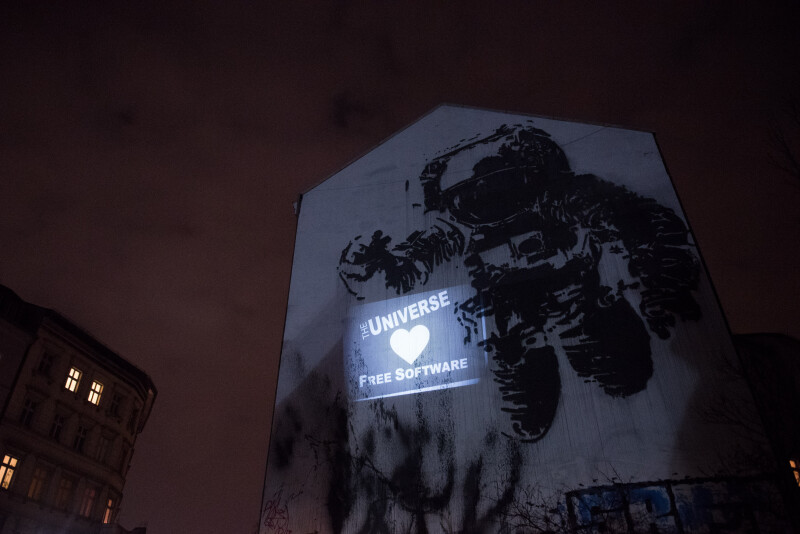
Local community projects
Any list of local FSFE community projects can only provide examples, since the FSFE builds its success on the shoulders of a diverse community spread over Europe. Together we support each other in our work with formal and informal meetings and networks, with sharing information and knowledge, and with spreading the word and setting up information booths.
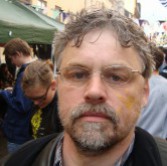
"I was a solitary voice for years, explaining the principles behind Free Software and its importance for people in my country in numerous articles and blog posts. I wanted to belong to an organization with the goal of building the digital society on 100% Free Software, and supporting the FSFE and gaining access to its blogging and fellowship infrastructure seemed like a logical first step. "
Carsten Agger
Some of us meet in local groups and use the chance for example to organise local events like cryptoparties or public debates. Others create public awareness, for example by printing their own leaflets or by creating a particular web presence in support of software freedom. We summarize these activities as local community projects and we understand these activities as a core concept of our volunteer-driven organisation.
To further facilitate local projects and to give everyone quick and easy support in their ideas, we recently introduced a regular call to apply for FSFE support for your local project. Applying is easy and we happily support you with our expertise, our information material, or our networks, or even financially. Watch out for the next call and so long find some inspiration about our community projects hereafter - exemplary for all the other local activities in the last months.
Example projects
- In April, many FSFE Supporters used our wiki to collect good Free Software solutions that help you with remote working while letting you stay in control of technology.
- The local FSFE group in Zurich created a website called "Learning like a pro" (original German: "Lernen wie die Profis") which they use to explain why Free Software matters in education. It proceeds describing individual Free Software solutions and how these solutions in particular can be used to make school learning efficient and easy.
- Our French team organised a conference-debate (video recording) at Sciences Po Paris with some of the local candidates for the mayoral elections in Paris, who are also digital specialists.
- Freedomvote has already been used on many occasions to help voters who care about freedom-related topics in their voting orientation. Most recently it was used for the Swiss Federal Council election (Gesamterneuerungswahlen) and in the past it has seen reuse in the Netherlands.

"The most fun part about engaging for FSFE is meeting real people and exchanging substantial information about relevant issues. These can be anything from rooting your cell phone, to learning Git, to understanding Free Software based business, to speaking up for the use of open standards in public organisations. "
André Ockers
Events we organised and participated in
Between the time we wrote the last yearly report back in October 2019 and this one, the spread of COVID-19 forced the cancellation of all physical events we have been preparing to participate in or to run ourselves. So we split this chapter between the time we still participated at physical events and the time thereafter.
Last physical meetings
From November 15 to 16 in 2019 we were running the yearly FSFE Community Meeting as part of the SFSCon. It was composed of social meetups, breakout sessions, future-planning sessions, and an official track organised by the FSFE. German deputy coordinator Florian Snow wrote a report afterwards to reflect the feeling and the good vibe we had, including links to the slides and videos of most of the presentations.

"Free Pizza (not as in freedom) lunch at the 2019 FSFE Community Meeting at SFScon. Photo by Patrick Masson"
At the end of 2019 the FSFE participated in the Cluster about:freedom, an on-site gathering at the 36th Chaos Communication Congress, composed of 12 civil society organisations and groups. In this position, we organised 19 self-organised sessions during the 4 days on various stages with additional concerts in the night and public Free Software Song sing-along sessions - among other activities.
Komm:on interviews Bonnie Mehring and Erik Albers at the booth at 36C3
We started the year 2020 with our pre-FOSDEM event in Brussels. The event was kicked off by a presentation from Marcel Kolaja, Vice President of the European Parliament, which was then followed by insights and presentations from diverse Free Software organisations from all over Europe - from Albania to Greece to Portugal. Among the participants were the leaders and representatives of several Free Software organisations and initiatives around Europe and many volunteers from our community.
This pre-event was followed by a strong all-around presence at FOSDEM itself with many talks from our community about the latest issues regarding FSFE and software freedom. Our infobooth was in great demand and our highly motivated team put smiles on many faces. We finally completed our presence with social evenings for our community on Saturday and Sunday night
Volunteer who wants his face to be hidden, Christian Kalkhoff, and Francesca Indorato at the FSFE booth at Fosdem
Meetings go online
Our last physical meeting before the shutdown in basically all European member states was the FSFE's system hackers meeting in Lyon. The System Hackers are the team who are responsible for the maintenance and development of a large number of FSFE's infrastructure and services. The FSFE's Legal and Licensing Workshop, on the contrary, was the first event that had to be cancelled due to the COVID-19 outbreak. In the meantime we have started reorganizing the conference into a continuing series of online presentations and discussions that take place on average of once a month.
More and more FSFE events had to be cancelled throughout the year. From the ones we organise ourselves we had to cancel our Conference on Digital Sovereignty and our yearly community meeting. And of course, countless events that we were planning to participate in, give talks at, and host information booths at have been cancelled. These cancellations impose a penalty on the FSFE because booths and talks have been some of the main channels over which we inform people about software freedom and the FSFE’s work. Losing these due to cancellation of events also means a heavily limited visibility for our topics and our organisation.

Screenshot including Bonnie Mehring and Gian-Maria Daffré during an online session about local group organisations by the FSF during their 35 years celebration
Meanwhile many events are running online and we are participating in many of them again to help spread the word about software freedom. Still, an online event does not have the impact of a booth where humans speak face to face with each other and interested people can get to know the people behind the FSFE in real life. So, to keep the software freedom movement solid and alive, please consider donating a part of your conference budget to Free Software organisations, including the FSFE.
Software Freedom Podcast
With the end of last year the FSFE started the Software Freedom Podcast. Katharina Nocun, Matthias Kirschner and Bonnie Mehring from the FSFE talk to experts from the Free Software community to discuss their work for Free Software or a related topic of their expertise. Offering these interviews as a podcast gives easy access for many people and enables spreading our message into new audiences at the same time. With every episode we focus on one special topic to help sharing insights on that particular topic with our listeners.
So far we had Cory Doctorow about DRM, Lydia Pintscher about KDE, Harald Welte about mobile freedom, Carmen Bianca Bakker about REUSE, Lawrence Lessig about regulation, Falcón and Braun about GNU Health and Miriam Ballhausen about copyright enforcement. Last but not least, we recently published our seventh episode with Vincent Lequertier about artificial intelligence. You can listen to the podcasts directly on our website, receive them through podcatchers from within your favourite Free Software podcast program, or download them directly. To make sure to not miss the newest episode, you can also subscribe to our Opus feed or MP3 feed - of course 100% DRM-free!
For you as a teaser,and an example our episode with Lawrence Lessig:
Your browser dows not support the audio element.
OPUS FeedMP3 FeedDownload:
OPUS
|
MP3
See all the podcasts
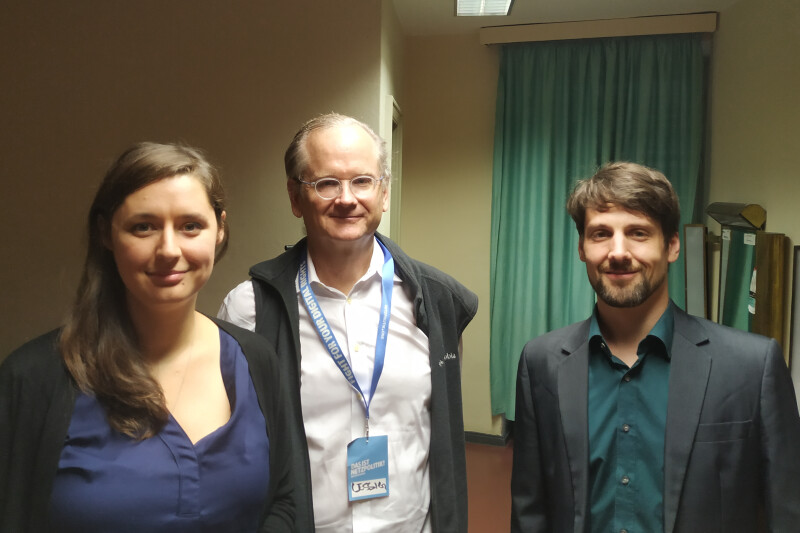
Katharina Nocun, Lawrence Lessig and Matthias Kirschner while recording the Software Freedom Podcast.
New look and feel of our web presence
We have been using the time of cancelled events to overhaul our web presence into a new feel and look and, most important, an improved presentation of information and a better user experience. In this process we also have been running our first online web-a-thon. Most obvious for anyone is the complete new look on our front page, where all the up-to-date information we publish every week now also has the most prominent and visible spots. For visitors starting their adventure from the front page, it is also much easier now to navigate to any other information on our pages that they are looking for.
We further took the chance to reapply existing content or to merge different spots of information into one. Some of the most interesting and important to many readers will probably be our page on general concepts about Free Software as well as the page of our activities. While the former now is visually improved with the help of graphics from our Public Money? Public Code! brochure, the latter finally puts all our different activities onto one page, offering visitors an overview sorted by topic and relevance.

The system hackers at their meeting in March 2020.
Many non-visible things have happened as well to further improve your online experience. One of these often hidden activities is the work of our System Hackers. This small team runs all the FSFE's digital infrastructure from our physical servers to virtual machines and individual services and it includes also the maintenance of it all. Since complexity grows with each new service and feature, the system hackers' recent months were dominated by enhancing automation, harmonisation and resilience of our systems. For instance, they introduced a new monitoring system currently spanning 21 systems with 242 service checks, and they are currently in the process of setting up two new server clusters.
Spreading the word of software freedom
Promotional Material
Besides its web presence, the FSFE empowers users to promote digital freedom in the real world by offering a large set of promotion material. You can Order your own material now and help us to spread the word! You find inspiration about the 100 freedoms of Free Software and why There is no Cloud, just other people's computers, or leaflets to help you explain Free Software, Email encryption, the dangers of DRM and how to Free Your Android. You can also find postcards, posters and stickers of our Public Money? Public Code! and I love Free Software campaigns.
New in our stock in 2020 are our Free Software stickers in multiple languages and colours and our Hacking 0100 Freedom stickers with binary language in multiple colors
In the last 12 months, we sent out 631 information material orders around the world. This means literally thousands of stickers, leaflets, and posters have been given out to people who are interested, or who
may be hearing about Free Software for the first time. If you would like to support us in this direct action, consider supporting us financially or consider a donation along with your personal order of information material. The right leaflet at the right time to the right person can be the start of long-lasting change.
Merchandise
In addition to our promotion material, we also offer you the chance to show your love for Free Software by using and wearing some of our merchandise items. Free Software clothing is a great way of raising awareness within your local community, and each sale helps to fund critical FSFE projects. This is especially true now, since we have a serious downturn of revenue by not being able to go to conferences and sell merchandise.
Our merchandise is a nice surprise for your loved ones for Christmas - and during the year.
So we made a virtue out of necessity and decided to do an extra sale with our old material. The interest and success were overwhelming and we sold 316 shirts and 38 hoodies in seven days. In contrast, we sold only 290 t-shirts and 71 hoodies in the 12 months before the extra sale. Most popular is the There is NO CLOUD shirt, followed by our 100 Freedoms of Free Software.
But the hitlist of items can be challenged since we have introduced a new multilingual t-shirt with which you can show your love for Free Software in 24 languages! Support our work and get your personal shirt today!
Who we are
It is no secret that even in the daily operations of the FSFE we rely on all the beloved people who help us continuously on different levels with their respective skills. It is only through working together with our community that the FSFE is able to form a movement across Europe to build a society based on users' and software freedom, a society in which users are empowered to control their technology.
Our movement
In the last few years, we exceeded ten thousand people from Europe and beyond who are supporting our cause by spreading our word, signing our open letters, subscribing to our community mails and newsletter, or joining our public discussions. If you ever wondered who all these people are and what a FSFE supporter looks like, we have created a dedicated testimonials page for you, where many of our supporters have left a quote, sometimes an interview and sometimes even a video.
See more testimonials
How you can become a part of our movement
The FSFE would be nothing without our contributors. And it would be so much more with you! If you feel inspired after reading our report, there are many ways to engage in our movement. We have a dedicated contribution page to help you find a way that best fits your interests and skills.
One of the easiest entrance levels is to spread the word about Free Software in public or among your friends with our promotion material or directly show your love for Free Software by wearing some of our inspiring merchandise items. Follow and share our event announcements, find an event that fits your interests, and then go there to meet like-minded people. Don't be shy; most of us have been in your position once. Or see if you can even join regular FSFE meetings in different cities of Europe.
Volunteer hosting a pop-up booth in the streets of Esino Lario during Wikimania.
If you find no event near you, you can also join us online. If you want to contribute with your IT skills or your language skills, you are more than welcome to join our respective online teams. Not yet sure where to start? Then look into our discourse-instance and start to get to know our community and get inspired about what you can do.
Finally, advocating for freedom also costs money and we depend on people like you to support us financially. All support is used to improve European software freedom a little more each day, step by step, bit by bit.
Staffers, team and the FSFE's formal members
Our staffers make sure to keep the FSFE's administration and daily operations running, from sending promotion material to donation receipts, from selling merchandise to organising our larger community events. But they also represent the FSFE officially in talks and presentations or in different kind of meetings.
At the FSFE we currently employ five full-time staffers and three part-time employees. These are, as full-time employees, the President, Matthias Kirschner; the policy advisor, Alexander Sander; and Gabriel Ku Wei Bin with Lucas Lasota, as part-time employee, running our legal department. Together with our part-time employee Bonnie Mehring, Max Mehl and Erik Albers work full-time to support our community and technical teams. Of course nothing would work without Francesca Indorato running our daily office operations. This permanent team has appreciated the help this year of our now former interns Bonnie Mehring and Erik Grun. As an attentive reader, you might have recognized that Bonnie Mehring indeed joined our permanent staff after finishing her internship this year. At the time of writing we are eager to enlarge our team again and we are looking for an additional office assistant. Also, we are always interested in internship applications.
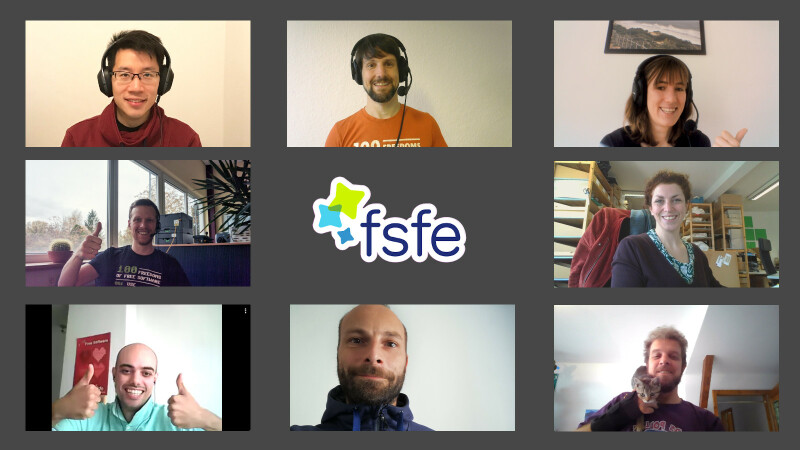
Your friendly FSFE staffers team, from left to right and top to down: Gabriel Ku Wei Bin, Matthias Kirschner, Bonnie Mehring, Max Mehl, Francesca Indorato, Lucas Lasota, Alexander Sander, Erik Albers
All staffers are officially contracted with the FSFE as an association with charity status, registered in Germany. The charity is governed by its formal members, the ("General Assembly"), who are responsible for planning, budgeting, and setting the agenda, as well as electing the Executive Council. In the 2019 General Assembly, the FSFE's President Matthias Kirschner, Vice-President Heiki Löhmus, and Financial Officer Patrick Ohnewein have been reelected to run the FSFE for another 2-year term.
Our transparency commitment
The FSFE supports the german initiative of a “transparent civil society” with our transparency commitment. Besides our constitution and minutes from our general assemblies, you will find information in our general reports, name and functions of decision makers and staff, our connections with other organisations, how we use our money, and who our donors are.
Looking forward
The ongoing Corona crisis will bring more dramatic changes to our societies. We will see more steps taken in a rush towards digitizing essential infrastructures and services that future generations will consequently have to build on. This is why it is incumbent upon us today to help ensure that our societies and any individual can stay in control of technology.
The community and the movement around the Free Software Foundation Europe had outstanding success this year with channelling our demands to create global solutions under free licenses. We also had success in convincing publicly-funded hackathons to publish their results as Free Software. But the journey continues and there is a lot more to do. We will keep raising our voice for true user freedom and help our societies to overcome the crisis more free than they entered it.
At the highest level, EU President von der Leyen does not tire in promoting a path for European digitisation that is both innovative and carbon-neutral. On the way to reach this goal, we will probably see a lot of investments in science, software, and technologies that help tackle climate change. Most of the money invested will be public money, and so we have to ensure that any such publicly spent money leads to public code as in Free Software as well. This should of course be the rule for any investments on national and local levels as well.
Given the circumstances, the FSFE will use the chance to offer more virtual community meetings. Be it for content-related teams and campaigns or for social gathering, soon we will start a series of knowledge sharing and networking events in our own Big Blue Button instance. Of course, we will continue with our public awareness campaigns and our political advocacy, with providing our expertise, and with providing resources to enable everyone to further promote Free Software in Europe. If you want to stay up to date with our milestones, sign up for our email updates.
Finally, we cannot be grateful enough and make this point often enough: All our work and successes during the last 12 months would not have been possible without our contributors and our financial supporters! Our big thank you to all of you!

Participants of the online GA 2020
And for those who want to support us but are still not doing it: To achieve our goals for the upcoming months we really need you: Please contribute as a volunteer or support us financially to ensure that our message is heard in as many diverse parts of our society as possible.
Future generations will be thankful. As we are already today!
Your Free Software Foundation Europe
About the Free Software Foundation Europe
The Free Software Foundation Europe (FSFE) is a charity that empowers people to control technology. Software is deeply involved in all aspects of our lives; and it is important that this technology empowers rather than restricts us. Free Software gives everybody the rights to use, understand, adapt and share software. These rights help support other fundamental freedoms like freedom of speech, press and privacy.
Our mission is:
- to help individuals and organisations to understand how Free Software contributes to freedom, transparency, and self-determination.
- to enhance users' rights by abolishing barriers to Free Software adoption.
- to encourage people to use and develop Free Software.
- to provide resources and enable everyone to further promote Free Software in Europe.
To help people understand our message, we use public campaigns and political lobbying, we provide expertise in talks and personal meetings, we set up informational booths and organise events, we produce promotion material and explanatory videos. To achieve our goals, we base our work and form our movement with the help of our community and friends, who ensure that our message gets out and is heard in as many diverse parts of our society as possible. We work in a transparent and cooperative way.
If you want to join our cause, contribute or support us financially.
Support FSFE

 La Commission Européenne présente une feuille de vigne (figuier en langue anglaise)
La Commission Européenne présente une feuille de vigne (figuier en langue anglaise)
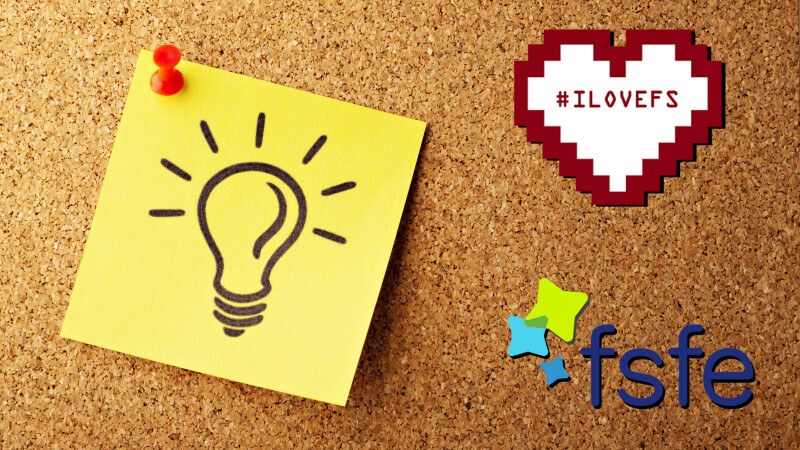
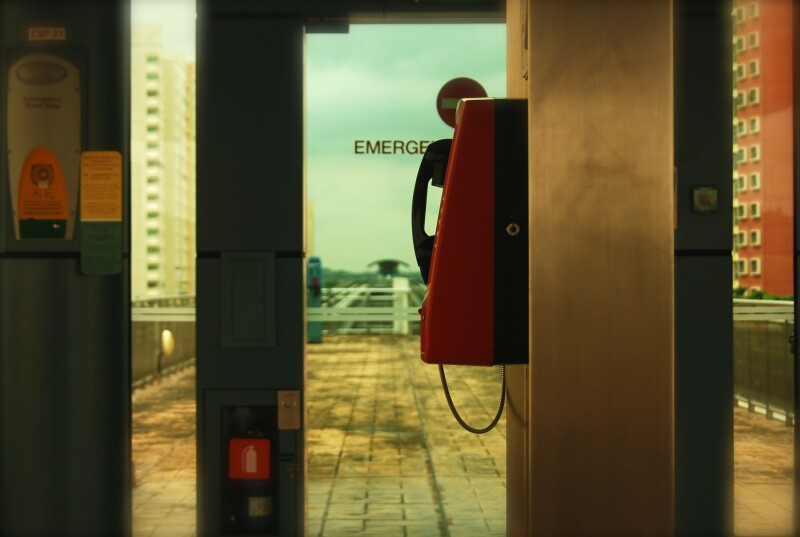
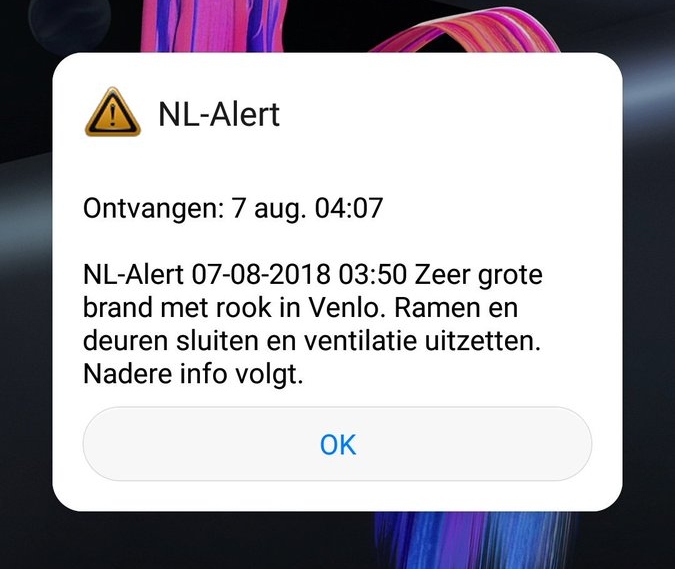 EU-Alert/NL-Alert Cell Broadcast message in 2018.
CC-BY-SA-4.0 by WarningMessageDelivery
EU-Alert/NL-Alert Cell Broadcast message in 2018.
CC-BY-SA-4.0 by WarningMessageDelivery

 Free Software creates global solutions.
Free Software creates global solutions.





 "Free Pizza (not as in freedom) lunch at the 2019 FSFE Community Meeting at SFScon. Photo by Patrick Masson"
"Free Pizza (not as in freedom) lunch at the 2019 FSFE Community Meeting at SFScon. Photo by Patrick Masson"
 Screenshot including Bonnie Mehring and Gian-Maria Daffré during an online session about local group organisations by the FSF during their 35 years celebration
Screenshot including Bonnie Mehring and Gian-Maria Daffré during an online session about local group organisations by the FSF during their 35 years celebration
 Katharina Nocun, Lawrence Lessig and Matthias Kirschner while recording the Software Freedom Podcast.
Katharina Nocun, Lawrence Lessig and Matthias Kirschner while recording the Software Freedom Podcast.
 The system hackers at their meeting in March 2020.
The system hackers at their meeting in March 2020.
 Your friendly FSFE staffers team, from left to right and top to down: Gabriel Ku Wei Bin, Matthias Kirschner, Bonnie Mehring, Max Mehl, Francesca Indorato, Lucas Lasota, Alexander Sander, Erik Albers
Your friendly FSFE staffers team, from left to right and top to down: Gabriel Ku Wei Bin, Matthias Kirschner, Bonnie Mehring, Max Mehl, Francesca Indorato, Lucas Lasota, Alexander Sander, Erik Albers
 Participants of the online GA 2020
Participants of the online GA 2020